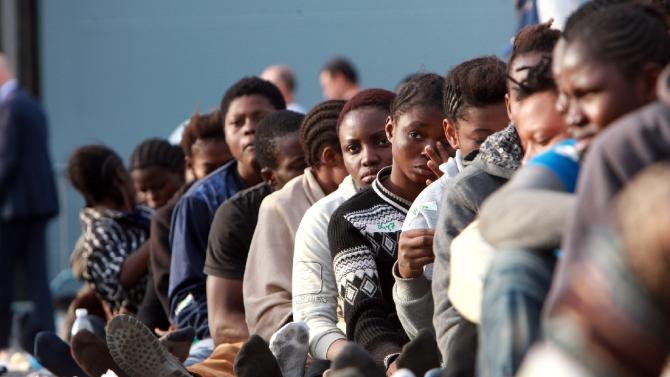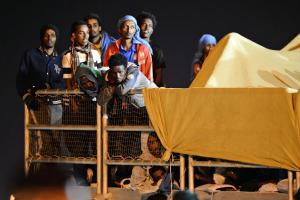Date: Tue, 9 Jun 2015 16:23:03 +0200
ATHENS, Greece (AP) — Hundreds of people using small boats and dinghies have arrived over the past day on the eastern Aegean islands near the Turkish coast, Greek authorities said Tuesday, part of a surge of tens of thousands of migrants landing on Greek shores in recent months.
The coast guard said 457 people had been rescued from the sea in 12 separate cases off the islands of Lesbos, Chios, Kalymnos and Kos in 24 hours from Monday morning. Another 304 people had made their way ashore Monday to Lesbos' main port of Mytilene.
With some of its islands just a mile or two off the coast of Turkey, Greece and its islands are a major entry point for migrants and refugees from Asia, Africa and the Middle East hoping for a better life in the European Union.
Few want to remain in the debt-stricken country where unemployment runs at above 26 percent, with most making their way to the more prosperous countries of Europe's center and north. They usually travel by land across Greece's northern border with Macedonia or cross the Ionian and Adriatic seas smuggled aboard ferries to Italy.
The increase in the number of people arriving in Greece has been dramatic. The International Organization for Migration said 46,150 migrants had already arrived in Greece in the first five months of this year, compared to about 34,000 for the full year 2014. Most, it said, were Syrians and Afghans.
The U.N. refugee agency, UNHCR, had slightly different figures, saying 48,000 refugees and migrants had reached Greece so far this year, the second-largest number in a EU nation after Italy, where 54,000 people have arrived.
About half of those arriving in Greece were coming ashore in Lesbos, UNHCR spokesman Adrian Edwards said during a briefing in Geneva. He said arrivals there had swelled to more than 7,200 in May.
Greece has long called for more assistance from the rest of the EU to deal with the influx, saying it cannot bear the brunt of the refugee and migration crisis alone.
**************************************************************
Mediterranean migrant crossings to Europe top 100,000 in 2015
Geneva (AFP) - More than 100,000 people have crossed the Mediterranean to Europe so far this year, the United Nations said Tuesday in what it called a "dramatic increase" in arrivals.
Since the beginning of the year, 103,000 refugees and migrants have risked their lives often on flimsy boats to reach Europe, the UN refugee agency said.
A full 54,000 have landed in Italy and 48,000 in Greece, while another 920 have arrived in Spain and 91 in Malta, according to fresh statistics.
They were the lucky ones. Mass drownings in the Mediterranean have claimed nearly 1,800 lives so far this year.
UNHCR "is stepping up its presence in Greece and in southern Italy in response to the dramatic increase in numbers of refugees and migrants who we have been seeing arriving," spokesman Adrian Edwards told journalists in Geneva.
The latest numbers included the nearly 6,000 people, most of them sub-Saharan Africans, plucked to safety from packed fishing boats and rubber dinghies off Libya and brought to Italy over the weekend.
Pregnant women and children were among those rescued, Edwards said.
He voiced particular concern over the exploding number of migrants and refugees reaching Greece, which saw just 34,000 arrivals during the full year of 2014, according to the International Organization for Migration.
There has been a surge in migrants trying to reach Greece's Aegean islands from the Turkish coast recently, mirroring the swell in perilous crossings from north Africa to Italy.
The Greek islands have been receiving an average of 600 people daily, mainly fleeing from conflict-torn Syria, Afghanistan and Iraq, with around half of them landing on the island of Lesvos, Edwards said.
"Record numbers of refugees are continuing to arrive in rubber dinghies and wooden boats on Lesvos, putting huge strain on the island's capacity and resources," he said, warning that reception facilities were vastly overstretched.
UNHCR, he said, was calling for "urgent reinforcement of personnel and resources of all the state services and civil society organisations dealing with the reception of refugees."
"We are also seeking increased support to the affected island communities," he said.


